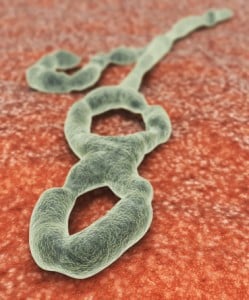 The recent Ebola virus outbreak has a lot of people scared, and with good reason. According to the CDC:
The recent Ebola virus outbreak has a lot of people scared, and with good reason. According to the CDC:
“First, by way of background, Ebola virus disease is very frightening. It is frankly a dreadful and merciless virus. The current outbreak is bad. It’s the biggest, most complex and the first time it’s been present in this region of the world which means that response systems and community understanding of the disease is not what it is elsewhere. It’s been deadly and far too many lives have already been lost. The outbreaks are occurring across many geographic areas of three countries which share a common border. That common border appears to be a, if not the, epicenter of the outbreaks. ”
On July 31st, the CDC issued a level 3 travel warning “to avoid nonessential travel to the West African nations of Guinea, Liberia, and Sierra Leone” because of the worsening outbreak.
As a company who sells the types of products that are needed for cleaning up body fluids and preventing infection during outbreaks such as this, it is our duty to inform the public about areas where we can help. Read through to the bottom of this article for a full list of the products we carry for dealing with this Ebola outbreak.
First, it is important to know that Ebola virus is transmitted through body fluids, most commonly saliva, blood, vomit, and mucous. People who come into close, personal contact with those infected are most susceptible to becoming infected. The virus spreads easily when infected body fluids come into contact with a person’s eyes, nose, or mouth. For this reason, hand hygiene is extremely important. We sell a variety of different hand cleaners that can be used to prevent infection here.
The CDC also has specific recommendations for cleaning up body fluids on surfaces:
- Wear impermeable disposable gloves while cleaning the passenger cabin and lavatories.
- Wipe down lavatory surfaces and frequently touched surfaces in the passenger cabin, such as armrests, seat backs, tray tables, light and air controls, and adjacent walls and windows with an Environmental Protection Agency (EPA)-registered low- or intermediate-level chemical household germicide. Follow manufacturer’s guidance for cleaning aircraft. Special cleaning of upholstery, carpets, or storage compartments is not indicated unless they are obviously soiled with blood or body fluids.
- Special vacuuming equipment or procedures are not necessary.
- Do not use compressed air, which might spread infectious material through the air.
- If a seat cover is obviously soiled with blood or body fluids, it should be removed and discarded by the methods used for biohazardous material.
- Throw used gloves away according to the company’s recommended infection control precautions when cleaning is done or if they become soiled or damaged during cleaning.
- Clean hands with soap and water (or waterless alcohol-based hand sanitizer when soap is not available) immediately after gloves are removed.
An important item to note here is the CDC recommendation to use “Environmental Protection Agency (EPA)-registered low- or intermediate-level chemical household germicide.” While we do sell EPA registered disinfectants at Worldwide Janitor, many of our products manufactured by Snee Chemical are only registered in Louisiana and Mississippi, therefore we are unable to sell them in other states by law.
What we can sell you if you are out of state is one of our selection of Champion Sprayon Aerosols. These disinfectants are EPA registered in all 50 states, and they are available from us in bulk by the case.
Another option is to use household bleach as a disinfectant, which we do carry. You can read the CDC guidelines on using bleach as a disinfectant here: http://www.cdc.gov/hicpac/disinfection_sterilization/6_0disinfection.html
Here is a list if the items we carry, in bulk sizes, that can be used to prevent Ebola infection:
- Bleach for disinfecting: 2.75%, 6%, and 10%. (See this article for more info on disinfecting with bleach).
- Hand Sanitizers
- Disposable gloves
- Aerosol Disinfectants
- Chemical Disinfectants (note delivery restrictions).
- Antibacterial Wipes
So be safe, and take care to use personal protection if you are coming into contact with bodily fluids that you suspect could be contaminated with Ebola.
Sources:
http://www.cdc.gov/media/releases/2014/t0731-ebola.html
http://www.cdc.gov/quarantine/air/managing-sick-travelers/ebola-guidance-airlines.html





